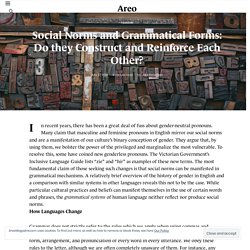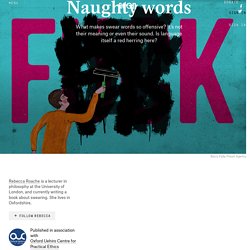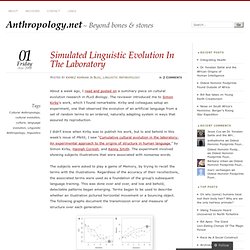

Social Norms and Grammatical Forms: Do they Construct and Reinforce Each Other? In recent years, there has been a great deal of fuss about gender-neutral pronouns.

Many claim that masculine and feminine pronouns in English mirror our social norms and are a manifestation of our culture’s binary conception of gender. They argue that, by using them, we bolster the power of the privileged and marginalize the most vulnerable. To resolve this, some have coined new genderless pronouns. The Victorian Government’s Inclusive Language Guide lists “zie” and “hir” as examples of these new terms. The most fundamental claim of those seeking such changes is that social norms can be manifested in grammatical mechanisms. The Declaration of Independence Is Hard to Read.
Why the Emoji Was Inevitable. The use of emojis has become a global phenomenon.

The Idiolect of Donald Trump. I was recently invited to give a lecture on my research in Washington, DC.

As a sociolinguist, I study the science of language in its social context. I began my lecture by describing the different ways that linguists subcategorize languages. Dialects, which most people are familiar with, are regional varieties of a language, like Texan or Midwestern English. But there are also ethnolects, associated with specific ethnic groups, like Chicano and Jewish English, and genderlects, which refer to the distinctive ways that women and men talk. Where does swearing get its power – and how should we use it? In 2012, The Sun newspaper reported that the British MP Andrew Mitchell, then a prominent member of the UK government, had called a group of police officers ‘fucking plebs’.

According to that story, the police thought about arresting him, but decided against it. In the wake of ‘plebgate’ (as this incident has become known), several journalists pointed to a double standard: Mitchell managed to escape arrest, but among the rest of us, arrests for swearing at the police are far from unheard of. These arrests have happened under Section 5 of the Public Order Act. The evidence is in: there is no language instinct — ... Imagine you’re a traveller in a strange land.

A local approaches you and starts jabbering away in an unfamiliar language. He seems earnest, and is pointing off somewhere. But you can’t decipher the words, no matter how hard you try. That’s pretty much the position of a young child when she first encounters language. Why is English so weirdly different from other langu...
English speakers know that their language is odd. So do people saddled with learning it non-natively. The oddity that we all perceive most readily is its spelling, which is indeed a nightmare. In countries where English isn’t spoken, there is no such thing as a ‘spelling bee’ competition. For a normal language, spelling at least pretends a basic correspondence to the way people pronounce the words. But English is not normal. Everyone Speaks Text Message. Why Do Americans and Brits Have Different Accents? In 1776, whether you were declaring America independent from the crown or swearing your loyalty to King George III, your pronunciation would have been much the same.

At that time, American and British accents hadn't yet diverged. What's surprising, though, is that Hollywood costume dramas get it all wrong: The Patriots and the Redcoats spoke with accents that were much closer to the contemporary American accent than to the Queen's English. It is the standard British accent that has drastically changed in the past two centuries, while the typical American accent has changed only subtly.
Siletz Language, With Few Voices, Finds Modern Way to Survive. But the forces that are helping to flatten the landscape are also creating new ways to save its hidden, cloistered corners, as in the unlikely survival of Siletz Dee-ni.

The man who helped 'simplify' Chinese. 21 March 2012Last updated at 20:22 ET By Michael Bristow BBC News, Beijing Mr Zhou has remained optimistic about life despite going through tough times Students struggling to learn Chinese might not know it, but their task has been made easier because of the work of one man.

Zhou Youguang helped invent Pinyin, a writing system that turns Chinese characters into words using letters from the Roman alphabet. Evolution of Language Takes Unexpected Turn. It’s widely thought that human language evolved in universally similar ways, following trajectories common across place and culture, and possibly reflecting common linguistic structures in our brains.

But a massive, millennium-spanning analysis of humanity’s major language families suggests otherwise. Instead, language seems to have evolved along varied, complicated paths, guided less by neurological settings than cultural circumstance. If our minds do shape the evolution of language, it’s likely at levels deeper and more nuanced than many researchers anticipated. “It’s terribly important to understand human cognition, and how the human mind is put together,” said Michael Dunn, an evolutionary linguist at Germany’s Max Planck Institute and co-author of the new study, published April 14 in Nature. The findings “do not support simple ideas of the mind as a computer, with a language processor plugged in.
Untitled. Language Evolution. Simulated Linguistic Evolution In The Laboratory. About a week ago, I read and posted on a summary piece on cultural evolution research in PLoS Biology.

The reviewer introduced me to Simon Kirby‘s work, which I found remarkable. Kirby and colleagues setup an experiment, one that observed the evolution of an artificial language from a set of random terms to an ordered, naturally adapting system in ways that assured its reproduction. I didn’t know when Kirby was to publish his work, but lo and behold in this week’s issue of PNAS, I saw “Cumulative cultural evolution in the laboratory: An experimental approach to the origins of structure in human language,” by Simon Kirby, Hannah Cornish, and Kenny Smith. The experiment involved showing subjects illustrations that were associated with nonsense words. The subjects were asked to play a game of Memory, by trying to recall the terms with the illustrations. Every language evolved from 'single prehistoric mother tongue first spoken in Africa' By David Derbyshire Updated: 00:25 GMT, 17 April 2011 500 languages traced back to Stone Age dialectThe further away from Africa a language is spoken, the fewer distinct sounds it hasEnglish has around 46 sounds, while the San bushmen of South Africa use a staggering 200Study finds speech evolved 'at least 100,000 years ago'
Fame for 23 Words is 15,000 Years Overdue - Issue 5: Fame. Remember when everything was “2.0?” Michelle Obama was Jackie Kennedy Onassis 2.0? Facebook was considered an example of Web 2.0? We all got what it meant and it hung in the air, or in “cyberspace,”—another faddish word—for half a decade until it was displaced from daily word usage by “3.0” and the “net.” Words, like people, have their 15 minutes of fame. Feast Your Eyes on This Beautiful Linguistic Family Tree. 552K 18.4KShare337 When linguists talk about the historical relationship between languages, they use a tree metaphor. An ancient source (say, Indo-European) has various branches (e.g., Romance, Germanic), which themselves have branches (West Germanic, North Germanic), which feed into specific languages (Swedish, Danish, Norwegian). Prehistoric language boundaries discovered « EvoAnth. Indo-European Languages Originated in Anatolia, Biologists Say.
The family includes English and most other European languages, as well as Persian, Hindi and many others. » Language may be much older than previously thought. A recent study brings together archaeological, biological and linguistic research to posit that spoken language may be much older than previously thought. How to raise a language from the dead. Chaucer wrote the Canterbury Tales in Middle English, not Old English. Did Stone Age cavemen talk to each other in symbols? Visit the caves of Pech Merle, Font-de-Gaume and Rouffignac in southern France and you will witness some of the most breathtaking art our planet has to offer. HISTORY OF LANGUAGE. Discover Sanskrit. The 13 Most Mysterious Unsolved Writing Systems. The history of writing is a long and interesting one. Magazine: Language. Omniglot - the guide to languages, alphabets and other writing systems.
Linguistic evolution - EvoWiki.